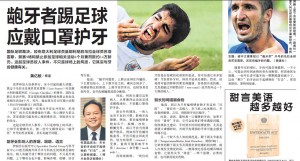 This article first appeared in the July 3rd, 2014 issue of Lianhe Zaobao LOHAS. For the benefit of those who missed the article, or who cannot access the publication in Chinese, we have summarized the content of the article below.
This article first appeared in the July 3rd, 2014 issue of Lianhe Zaobao LOHAS. For the benefit of those who missed the article, or who cannot access the publication in Chinese, we have summarized the content of the article below.
One of the most talked about topics this World Cup is Team Uruguay’s Luis Suarez’s biting incident that caused injury to Italian player Giorgio Chiellini. As a result, Suarez was suspended from playing the next 9 official matches and all football-related activities for 4 months, and would have to pay a fine of S$14,000.
This is not the first time that Suarez used “biting” to express his displeasure when faced with a conflict on the field. Some psychologists claimed that Suarez may have buried psychological factors that lead to his actions.
This “biting” incident is not only news on the soccer field, but is also related to dental health.
Protruding teeth may cause swallowing, chewing and speech problems
Dr Ho Kok Sen, a dental specialist in oral and maxillofacial surgery from Specialist Dental Group® at Mount Elizabeth Medical Centre, pointed out that patients with protruding teeth or extended lower jaw will not only face cosmetic issues but the increased space between the upper and lower teeth will also cause biting problems, affecting functions like swallowing, chewing and speech problems.
He says, “Patients with protruding teeth tend to have their upper lips appear more forwards as a result of the underbite and they usually present with a retruded (backwards) chin or small chin. The increased space between the upper and lower teeth in the horizontal aspect makes incising (chewing) of food more difficult. As the upper teeth are more forwards, they are also more prone to trauma and injury.”
As such, Dr Ho recommends for patients with protruding teeth who play contact sports like rugby and football to wear mouth guards.
Aside from being prone to trauma, bad habits such as chewing on hard foods like peanuts, betal nuts, ice cubes, crab shells, prying open bottle caps using teeth, may also affect dental health. Our teeth can be damaged when we bite on very hard objects, from causing chips to the enamel, to greater damage involving the deeper layers of the tooth such as dentine and pulp.
Dr Ho explains, “Our teeth is made of hard enamel. Enamel is so hard that in order to cut it to do a filling, dentists use diamond coated dental burs. However enamel can get brittle and crack or shear off. The probability increases especially if the tooth is already compromised with a previous large dental filling or if the tooth has been root canal treated.”
Do not chew on foods for prolonged periods of time
Dr Ho said not to assume that only biting on hard foods will cause “risks” to your oral cavity. “There was once a patient who fractured his front tooth after he bit into an ice cream given to him on board an airplane. The tooth had to be extracted and replaced with an implant.”
Eating and talking depend on a healthy set of teeth. If you don’t take care of your pearlie whites, it will result in a lot of dental problems. Dr Ho recommends that we should not to bite on hard, chewy foods for prolonged periods of time, as the teeth may experience pain due to the supporting gums around the teeth.
There is also a lesser known dental condition called the inflammation of the temporomandibular joints (TMJ). Patients who are diagnosed with this condition can make a simple diet change to something that is easy to chew and swallow for the “jaw to rest” for 1 to 2 weeks, which will help with the pain and discomfort.
As we age, our teeth become more brittle and if careless, there is a tendency for teeth to crack or fracture on hard chewing. Dr Ho Kok Sen would like to remind elderly people with several missing teeth to take extra care, as the lone standing teeth usually do not sustain biting stress very well and have a higher tendency to be damaged.





